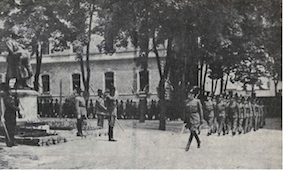VWI invites/goes to...
Cycle of VWI Fellows’ Colloquia
The VWI fellows present their intermediary research results in the context of colloquia which are announced to a small audience and are open to a public audience with an academic and topical interest. The lectures are complemented by a response or commentary by an expert in the given field and are discussed with the other fellows.
Due to the previous lack of an appropriate space, the colloquia were held at other Viennese research and cultural institutions with a topical or regional connection to the given subject. From this circumstance was born the “VWI goes to …” format.
With the move to a new institute building at Rabensteig 3, the spatial circumstances have changed, so that the VWI is now happily able to invite other research and cultural institutions. Therefore, the VWI is now conducting its colloquia both externally and within its own building, in the framework of continued co-operation with other institutions.
The new cycle of fellows’ colloquia “VWI invites/goes to …” is not only able to reach a broader circle of interested persons, but moreover integrates the VWI further into the Viennese scholarly establishment, perhaps even crossing borders into the greater regional research landscape.
| VWI invites/goes to... | |||
| Judit Molnár: Crime and Punishment? The Hungarian Gendarmerie during and after the Holocaust | |||
Wednesday, 4. November 2015, 19:00 - 20:30 Balassi Institute – Collegium Hungaricum Vienna, 1020 Wien, Hollandstraße 4
|
|||
VWI goes to the Collegium Hungaricum
The Royal Hungarian Gendarmerie was one of the most important state institutions between 1881 and 1945. Its task was to preserve law and order in the countryside, to prevent peasant uprisings as well as a socialist agitation in the villages, and, in 1944, to deport the Hungarian Jews to Auschwitz.
Comments by Marius Wigl
Judit Molnár is Senior Research Fellow at the VWI. She is Associate Professor at the University of Szeged since 1998. From 1994, she is also the deputy director of the Hungarian research group of the Yad Vashem Archives. She organised the first Hungarian permanent Holocaust exhibition in Budapest (2004-2006) and was the chief historical advisor at the Holocaust Memorial Centre between 2009 and 2011. Her research field is the history of the Jews in Hungary in the 20th century. She focuses on the history of the Hungarian Jewish Leaders during the Second World War and the Role of the Royal Hungarian Gendarmerie in the Holocaust.
Marius Weigl is a historian; at the moment he is a PhD candidate in the Interdisciplinary PhD Programme at the Alpen-Adria University of Klagenfurt. His research field is "Science – Administration – Police: The Solution of the 'Gypsy Question' in Austria-Hungary during WWI".
In cooperation with:
|
|||











 To address this question, the size of the gendarmerie and the number of those participating in the deportation must be made clear. Their connection with other agencies, above all the police and the administration, as well as their attitudes to the persecution of Jews and to deportations must be clarified. Were the gendarmes cruel, as most of the survivors claim, or, on the contrary, did they help the persecuted, protest, or perhaps refuse to obey orders, as former gendarmes claim and some people in Hungary are still trying to have the public believe? And finally, what did they, what could they know about the destination of the deporting trains, about the true, final end of the deportations?
To address this question, the size of the gendarmerie and the number of those participating in the deportation must be made clear. Their connection with other agencies, above all the police and the administration, as well as their attitudes to the persecution of Jews and to deportations must be clarified. Were the gendarmes cruel, as most of the survivors claim, or, on the contrary, did they help the persecuted, protest, or perhaps refuse to obey orders, as former gendarmes claim and some people in Hungary are still trying to have the public believe? And finally, what did they, what could they know about the destination of the deporting trains, about the true, final end of the deportations? 
